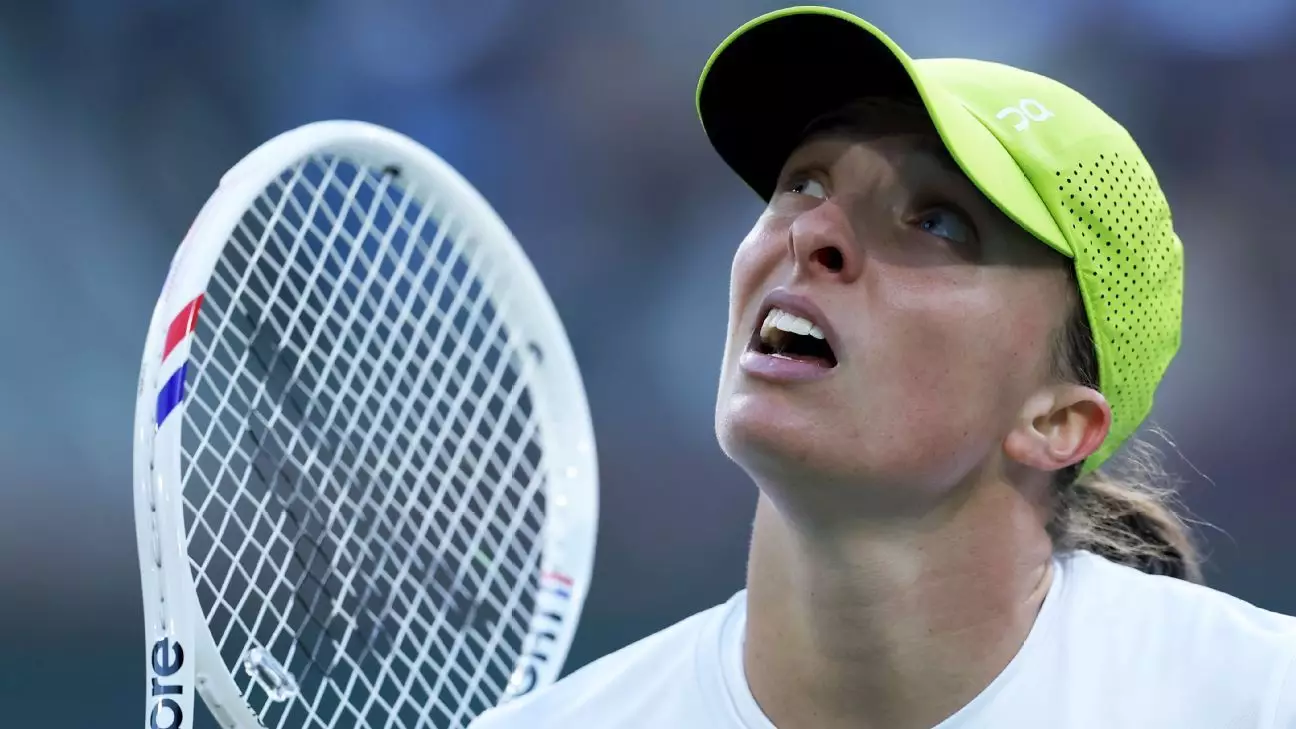Iga Swiatek, a name synonymous with tennis excellence, has recently taken to social media to shed light on the emotional challenges she has confronted over the past months. Drenched in a whirlwind of scrutiny, she courageously chose to open up about her feelings in a heartfelt Instagram post. The notion of vulnerability in the world of sports often gets relegated to the sidelines, overshadowed by the intimidating façade that athletes project. Swiatek’s willingness to share her turmoil—the anxiety over her rankings and the repercussions of a doping controversy—provides a much-needed counter-narrative to the perception of invincibility that often surrounds professional athletes.
In her candid communications, Swiatek revealed that she spent considerable time grappling with her mental health, including a poignant admission of crying daily for three weeks. This raw honesty allows us to peer into the human side of the athlete, reminding us that behind the fierce competition lies a woman wrestling with her own insecurities and pressures. The societal expectation for athletes to maintain a stoic demeanor often breeds a toxic environment where their humanity is overlooked. Swiatek’s outspokenness challenges us to reconsider how we judge athletes not only by their performances but also by the emotional turbulence they endure.
The Weight of Public Scrutiny
In her post, Swiatek addressed an incident during her semifinal match at Indian Wells where she inadvertently hit a ball close to a ball boy out of frustration. This moment transformed into a media frenzy, reflecting the intense scrutiny that professional athletes face. The immediate and harsh critiques of her actions highlight a grim reality: the public and the media are often quick to cast judgment without context. Swiatek pointed out the double standards in how athletes are perceived based on their emotional expressions, oscillating between being labeled robotic for lack of emotion and immature for displaying vulnerability.
The social media landscape fuels this judgment culture, where a single moment can define an athlete’s character in the eyes of the public. Swiatek’s lament about society’s obsession with critique resonates profoundly. Her ability to articulate the pain caused by such judgment invites a reconsideration of how we analyze and discuss athletes’ behaviors on and off the court. Instead of promoting understanding and empathy, the culture surrounding sports often revels in character assassinations based on isolated incidents.
The Pressure of Expectations
Swiatek’s reflections also delve into the pressure that comes with being ranked number one. Losing that status, combined with the swirling chaos of her recent doping suspension, created an emotional maelstrom that left her reeling. Despite her illustrious track record—including multiple Grand Slam titles—Swiatek exposed the fragility of confidence that can be all too prevalent among top athletes. The psychological toll of such immense pressure is painfully real; it can lead to a sense of despair and a profound feeling of inadequacy, which she described as feeling her career was “hanging by a thread.”
This discourse opens the floor for a broader conversation about mental health in sports. How often do we consider that the drive to maintain high performance can lead to severe mental strain? Swiatek’s experience serves as a crucial reminder that the pursuit of excellence often comes at the cost of mental well-being. Recognizing this dimension is vital not just for fans and the media but for fellow athletes, who may also be grappling with similar struggles in silence.
Redefining Success and Self-Compassion
Through her struggles and triumphs, Swiatek emphasizes the importance of self-compassion. The notion that athletes must endure relentless judgment can create a toxic cycle that hampers their mental health and performance. Instead of chasing an arbitrary standard of perfection that society imposes, Swiatek’s story teaches us the value of understanding and accepting one’s own emotional journey. Her steadfast resilience in the face of adversity encourages both athletes and fans to redefine what success truly means—a holistic view that includes emotional and mental well-being.
In her ongoing journey back to the court, Swiatek’s openness to address her vulnerabilities not only resonates deeply but also serves as a beacon of hope for others facing similar challenges. The discourse surrounding mental health in sports is shifting, and Swiatek is unapologetically at the forefront of this conversation, steering it towards an embrace of authenticity and compassion. As we follow her career, we should remember that behind the accolades and titles lies a story that reflects not just athletic prowess but an inspiring journey of overcoming internal battles.

